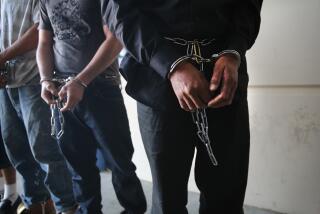Fraud in death row cases alleged
- Share via
State prosecutors on Wednesday charged a San Joaquin, Calif., private investigator with forging and falsifying documents to help four death row inmates in what authorities called one of the largest frauds on the justice system in California history.
The 17-page criminal complaint filed against Kathleen Culhane in Sacramento County Superior Court capped a one-year investigation triggered by suspicious declarations submitted by Culhane in the clemency bid of death row inmate Michael Morales, said Nathan Barankin, a spokesman for the attorney general’s office.
Morales, 47, of Stockton was convicted of the 1981 rape and murder of Terri Winchell, a 17-year-old Lodi high school student.
Morales was sentenced to death in 1983. His execution is on hold pending a federal review of the state’s lethal injection protocol.
Last February, attorneys for Morales withdrew sworn statements from five of six jurors urging Gov. Arnold Schwarzenegger to stop Morales’ execution, amid allegations that the defense documents were fraudulent.
In all, Culhane allegedly filed questionable declarations on behalf of 11 jurors, two witnesses, two court interpreters and one police officer while working as a private investigator for the state-funded Habeas Corpus Resource Center in San Francisco and in private practice between November 2002 and February 2006, Senior Assistant Atty. Gen. Mike Farrell said.
The documents were filed in the cases of death row inmates Morales; Vicente Figueroa Benavides, convicted by a Kern County jury of the 1991 murder, rape and sodomy of a 21-month-old; Christian Monterroso, convicted by an Orange County jury of the 1991 murders of Tarsem Singh and Ashokkumar Patel; and Jose Guerra, convicted by a Los Angeles County jury of the 1990 rape and murder of Kathleen Powell.
State prosecutors were investigating whether other fraudulent evidence prepared by Culhane was presented to the courts in those and other cases.
Culhane pleaded not guilty at an arraignment Wednesday and was jailed in lieu of $50,000 bail.
In an interview, Culhane’s defense attorney, Stuart Hanlon, described her as a law school graduate “strongly opposed to the death penalty.”
“We are going to evaluate all the evidence and then determine whether to go to trial or seek a resolution,” he said.
In a separate interview, Farrell said, “It doesn’t matter whether you’re for or against the death penalty; you have to play by the rules. She played by her own rules to undermine the judicial system in the most serious cases out there: capital cases.”
Although Culhane’s actions have not affected the inmates’ cases, Farrell said, “Courts have granted their defense attorneys more time to interview the people she had pretended to have talked to.
“So, although she failed to achieve her goal of getting the inmates out of prison,” he said, “because of what she did, their already grindingly slow cases will just drag on further.”
Loyola University law professor Laurie Levenson, a former federal prosecutor, agreed.
“Of all the challenges facing death penalty cases these days, who would have thought one of them would be filing false declarations?” she asked.
“This case is as egregious as it gets; it goes to the heart of the integrity of the justice system in the most important kind of case it deals with,” Levenson said.
“The courts have to be able to rely on these important declarations in order to determine whether there were problems with the jury’s verdict.”
If convicted on all 22 counts of filing a false document, 22 counts of forgery and one count of perjury, Culhane could get a maximum sentence of 18 years and 8 months in prison, officials said.
Michael Lawrence, a spokesman for the Habeas Corpus Resource Center, declined to comment.
The case against Culhane began when San Joaquin prosecutors, in arguments submitted to Schwarzenegger, named her as the Morales investigator who “supposedly interviewed five of the six jurors” and discovered they had a change of heart.
Culhane, they added, also said she had interviewed a key witness in the case, Patricia Felix.
They said that in her own sworn declarations, Culhane said she met with Felix several times in January 2006 at her home in Stockton.
Felix has not lived at the address Culhane cited since July 2005, prosecutors said.
Similarly, the five jurors in question told prosecutors under oath that they had never been contacted by anyone from the Morales team, and had no idea who Kathleen Culhane was.
More to Read
Sign up for Essential California
The most important California stories and recommendations in your inbox every morning.
You may occasionally receive promotional content from the Los Angeles Times.











